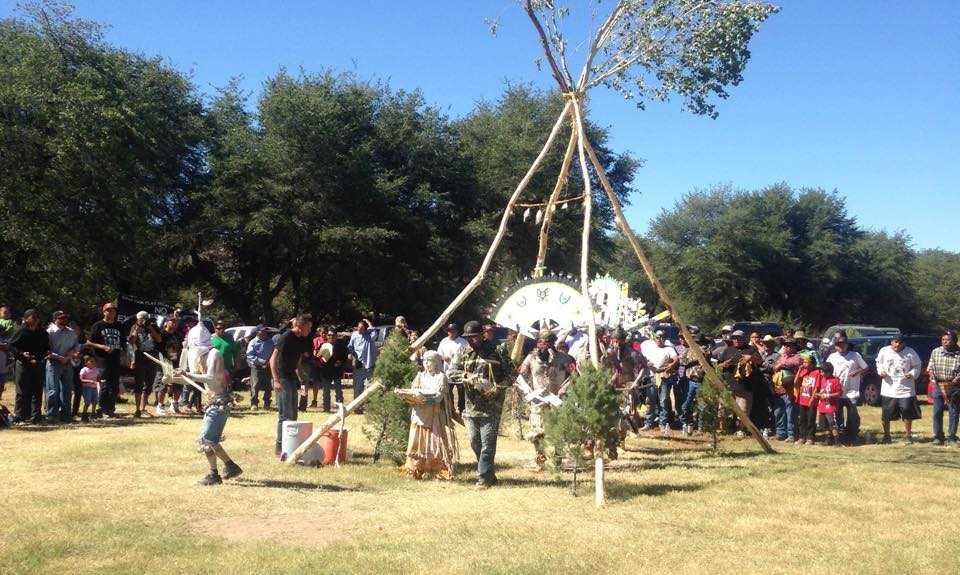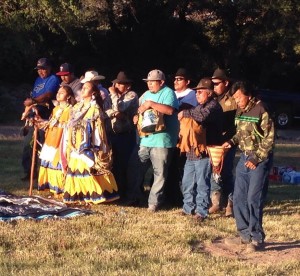
DGR Stands with the San Carlos Apaches in Protecting Oak Flat from Copper Mining
Image Credit: Ryan Martinez Lewis
Deep Green Resistance (DGR) is dedicated to the fight against industrial civilization and its legacy of racism, patriarchy, and colonialism. For this reason, DGR would like to publicly state its support of the San Carlos Apache tribe and the residents of Superior, AZ in the fight to protect Oak Flat from the destructive and unethical practices of foreign mining giant Rio Tinto.
Background
For over a decade the San Carlos Apache tribe and supporters have been fighting against profit-driven attacks on their land by the Superior, AZ based company Resolution Copper (RC), a subsidiary of the international mining conglomerate Rio Tinto. The foreign Rio Tinto is an Anglo-Australian mining company with a shameful history of environmental degradation, human rights abuses, and consorting with oppressive regimes around the globe.
Resolution Copper plans a massive deep underground copper mine in the Oak Flat area using a technique called block caving, in which a shaft is drilled more than a mile deep into the earth and the material is excavated without any reinforcement of the extraction area. Block caving leaves the land above vulnerable to collapse.
Despite this, Resolution Copper is set to acquire 2,400 acres of the federally protected public land in the Tonto National Forest in southeast Arizona in exchange for 5,000 acres in parcels scattered around the state. The 2,400-acre land, part of San Carlos Apache’s aboriginal territory, includes Oak Flat, Devil’s Canyon, and nearby Apache Leap – a cliff where Apaches jumped to their death to avoid being killed by settlers in the late 19th century. The San Carlos Apaches and other Native people hold this land as sacred, where they conduct ceremonies, gather medicinal plants and foods, and continue to build connections with the land. The now public land is held in trust by the federal government and is also used by non-Native nature lovers for hiking, camping, bird watching and rock climbing, and is used for field trips by Boy Scout groups.
Recent Activity
On December 4, 2014 the House passed the National Defense Authorization Act (NDAA), which included the Oak Flat Land exchange as an attachment to the annual must-pass defense bill. This particular version of the land exchange included in the NDAA (the “Southeast Arizona Land Exchange and Conservation Act of 2013”) is the 13th version since the bill was first introduced in Congress in 2005 by former Congressman, Rick Renzi (later convicted in 2013 of multiple counts of corruption, including extortion, racketeering and other federal charges). AZ Senators McCain and Flake, responsible for sneaking this unrelated attachment into the NDAA, subverted the will not only of Native American Tribes, conservation organizations, the Superior Town Council, and others, but the will of the United States Congress which has forcefully rejected the land exchange for nearly 10 years. Flake, who previously worked for Rio Tinto at their uranium mine (co-owned by the Iranian government) in Namibia, acknowledged the bill could not pass the US Congress on its own merits.
Shortly after passing through the House, the NDAA was signed into law by President Obama on December 19, 2014, exactly 5 years after he signed the “Native American Apology Resolution,” a little-noticed expression of regret over how the U.S. had abused its power in the past.
The Southeast Arizona Land Exchange and Conservation Act demonstrates a total disregard for Native American concerns. Resolution Copper has also openly admitted to the fact that their process of mining would create significant land cracking and eventually subsidence. Another grave concern is the permanent damage to surface and groundwater. This mine will deplete enormous quantities of water and pollute it, which will devastate local communities.
Oak Flat is also a rare desert riparian area. Less than 10% of this type of habitat remains in Arizona. The land exchange would allow mining companies to avoid following our nation’s environmental and cultural laws and would bypass the permitting process all other mines in the country have followed. Since this mining would, by design, lead to the complete destruction of the Oak Flat area and potentially impact both Apache Leap and Gaan Canyon, the San Carlos Apache Tribe (along with over 500 other tribes across the country) strongly opposes it and the illegal land exchange.
Call for Solidarity
Indigenous peoples have always been at the forefront of the struggle against the dominant culture’s ecocidal violence. Beneath the violations of US law lies the glaring threat of sacred Apache land being further harmed and colonized. If RC is allowed to follow through with its mining plan, not only would this land be stolen from the Apaches, but it would be rendered unrecognizable.
There is a monumental need for solidarity work to save Oak Flat. The only acceptable action on the part of Resolution Copper is immediate cessation of any and all plans to mine in the ancestral home of the Apache people; anything else will be met with resistance, and DGR will lend whatever support it can to those on the front lines. The time to act is now!
For more information or to lend support, please visit the Arizona Mining Reform Coalition.
**DGR recognizes that members of settler culture are living on stolen land in the midst of a current and ongoing genocide of indigenous people and culture. We encourage those who wish to be effective allies to indigenous people to read our Indigenous Solidarity Guidelines.
References
- “Apache Resistance to Copper Mining in Arizona.” Survivalsolidarity.wordpress.com. <http://survivalsolidarity.wordpress.com/apache-resistance-to-copper-mining-in-arizona/>
- “Cultural and Religious Concerns.” Accessfund.org. <http://www.accessfund.org/site/c.tmL5KhNWLrH/b.8113233/k.D328/Cultural__Religious_Concerns.htm>
- McAuliff, Michael. “Congress Raids Ancestral Native American Lands With Defense Bill.” Huffingtonpost.com.<http://www.huffingtonpost.com/2014/12/03/ndaa-land-deals_n_6264362.html>
- McKinnon, John D. “US Offers An Official Apology to Native Americans.” blogs.wsj.com. <http://blogs.wsj.com/washwire/2009/12/22/us-offers-an-official-apology-to-native-americans/>
- “President Obama signs land exchange into law signaling new phase in the protection of Oak Flat.” Azminingreform.com. <http://www.azminingreform.com/content/president-obama-signs-land-exchange-law-signaling-new-phase-protection-oak-flat>
- “Resolution Copper.” Gpo.gov. <http://www.gpo.gov/fdsys/pkg/CHRG-112shrg75271/html/CHRG-112shrg75271.htm>
- “Rio Tinto: A Shameful History of Human and Labour Rights Abuses And Environmental Degradation Around the Globe.” Londonminingnetwork.org. <http://londonminingnetwork.org/2010/04/rio-tinto-a-shameful-history-of-human-and-labour-rights-abuses-and-environmental-degradation-around-the-globe/>
- Toensing, Gale Courey. “San Carlos Apache Leader Seeks Senate Defeat of Copper Mine on Sacred Land.” Indiancountrytodaymedianetwork.com. <http://indiancountrytodaymedianetwork.com/2014/12/08/san-carlos-apache-leader-seeks-senate-defeat-copper-mine-sacred-land-158181>
- Wagner, Dennis. “Arizona’s ex-Rep. Rick Renzi gets 3-year prison term.” usatoday.com. <http://www.usatoday.com/story/news/politics/2013/10/28/rick-renzi-arizona-prison-sentence/3288937/>

